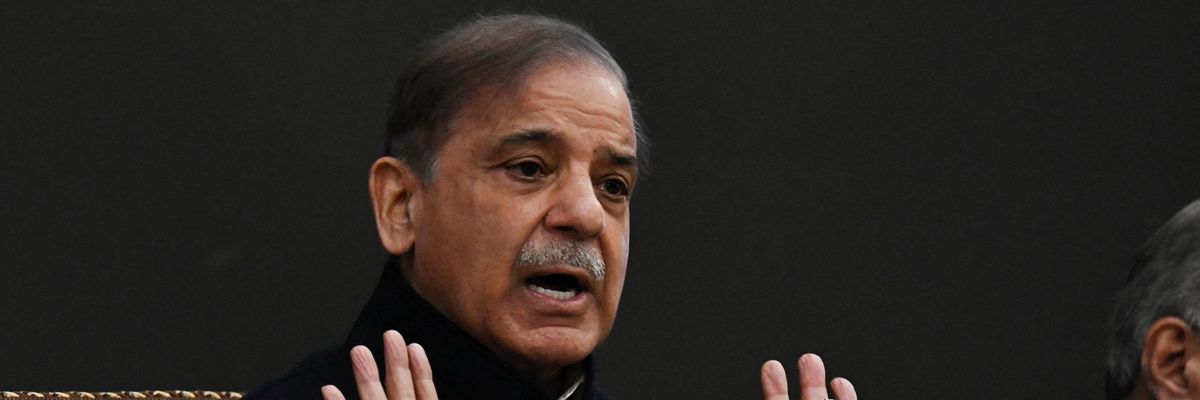Pakistani lawmakers on Sunday elected Shehbaz Sharif to serve a second term as the country's prime minister following elections last month that were widely decried as illegitimate, with top officials and the military
manipulating the vote and cracking down on the party of jailed former Prime Minister Imran Khan—the nation's most popular politician.
The election of Sharif, the younger brother of three-time Prime Minister Nawaz Sharif,
drew shouts of protest from Khan's allies in Parliament who supported Omar Ayub, who served as federal minister for economic affairs under Khan. Despite facing large-scale repression ahead of the February contest, candidates backed by Khan's Pakistan Tehreek-e-Insaf (PTI) party won more seats than any other party—but not enough for an outright majority.
Sharif's Pakistan Muslim League-Nawaz (PMLN) party, the favored party of the nation's military, formed an alliance with the Pakistan People's Party and others, a partnership that Khan allies have
derided as a "coalition of losers" and "mandate thieves."
Less than two weeks after the national elections, a top Pakistani administrative official publicly admitted to manipulating the results by converting "losers into winners, reversing margins of 70,000 votes of independent candidates for 13 national Parliament seats."
PTI-backed candidates were forced to run as independents after election authorities banned the party's well-known symbol, a cricket bat.
Days before Sharif's election as prime minister, U.S. lawmakers led by Rep. Greg Casar (D-Texas) expressed concerns about "pre- and post-poll rigging" and
called on President Joe Biden and Secretary of State Antony Blinken to withhold recognition of a new Pakistani government until a "thorough, transparent, and credible investigation of election interference has been conducted."
"Without taking this necessary step, you risk enabling anti-democratic behavior by Pakistani authorities and could undermine the democratic will of the Pakistani people," reads the letter, which was signed by more than 30 Democratic lawmakers.
"Pakistan is a longstanding ally of the United States, and we recognize the importance of our relationship for regional stability and counterterrorism efforts," the letter continues. "It is in the U.S. interest to ensure that democracy thrives in Pakistan and that election results reflect the interests of the Pakistani people, not the interests of the Pakistani elite and military. We look forward to working with you to show Pakistanis that the U.S. stands with them in their fight for democracy and human rights."
Last August, The Interceptobtained a secret cable indicating that the Biden administration pressured the Pakistani government to remove Khan as prime minister. Khan was ousted in a no-confidence vote shortly after two American diplomats met with Pakistan's ambassador to the U.S. in March 2022.
Khan has since been imprisoned on corruption charges that he and his supporters say are politically motivated.
In an interview with Voice of America on Friday, Casar said he has "long studied" how "the United States supported coups, supported military governments, and suppressed democracy in Latin America."
"And that ultimately hurt, not just Latin Americans, but also hurt people in the United States. It did not work. It did not work economically. It did not work for our safety," said Casar. "The same should apply with [the] United States and Pakistan. We should not simply let geopolitics or corporations or our military alliance override our core value of democracy."
Addressing suggestions that his call for an investigation of the February election might constitute "meddling" in Pakistan's internal politics, Casar said that "our interest is not whether one group or another group wins an election."
"The people of Pakistan should be able to decide their own election," said Casar. "We have very clear laws that aid is contingent on human rights being respected, free speech being respected. We do not want the United States taxpayer dollars to go to militaries that then use that money to incarcerate journalists or suppress free speech or suppress political parties."

